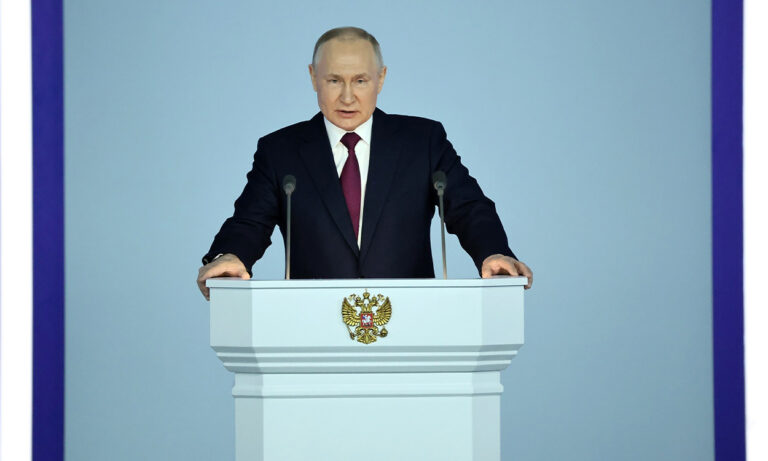One year after the beginning of the war in Ukraine, Putin threatens the West with nuclear aggression

Over the past 20 years, Vladamir Putin has strengthened his global autonomy as premier of Russia, solidifying his international reputation as a prickly President and a ruthless and narcissistic Dictator. And, at the beginning of 2021, in what was one of his most diabolical acts of power, Putin spearheaded an unjustified and uncouth crusade against the neighbouring Ukraine.
Now, one year after the war began, the Russian leader has taken things that bit further—by actively considering and promoting the idea of nuclear aggression against the West.
In a speech to the Russian Parliament on 21 February 2023, Putin declared that the nation would be suspending its participation in the New START Treaty. This agreement was the last remaining nuclear arms control treaty between Russia and the US. It limits the nuclear arsenals of the two countries—and now Putin officially wants out.
According to the BBC, the Russian president announced that he had signed a decree on “putting new ground-based strategic complexes on combat standby duty.” He warned that Russia was ready to resume nuclear weapons testing, noting: “of course, we will not do it first. But if the US conducts tests, we will do it as well.”
Putin wants to show the US that he’s prepared to take Ukraine with extreme force, and that more western involvement will plunge the world further into crisis.
As depicted by a timeline created by the North Atlantic Treaty Association (NATO), Putin has pursued a very clear mandate from the moment he entered office—one of political aggression, unfounded conflict, and serious international trepidation when it comes to Western powers.
As is practically customary at this point, US President Biden held his own public debriefing on 21 February—almost certainly in response to Putin’s earlier conference. In his own speech, Biden reaffirmed the US’s allegiance to the Ukrainian effort, stating: “Our support for Ukraine will not waver, NATO will not be divided, and we will not tire.”
He continued: “President Putin’s craven lust for land and power will fail. And the Ukrainian people’s love for their country will prevail.”
What does Putin’s speech mean for the state of international relations?
SCREENSHOT spoke with Campbell Craig, Professor of International Relations at Cardiff University, about how Putin’s recent comments regarding nuclear warfare might impact the state of global diplomacy.
Craig stated: “Putin has suspended Russian participation in the START talks, clearly as a retaliation against US support for Ukraine in the ongoing war. This is probably nothing more than a gesture, since Putin has very few other means at his disposal of hurting the US. Should the war conclude in a way that allows Putin to save face, it is likely that he will rejoin the talks and there will have been no harm done.”
The professor continued: “It’s another example of diplomatic initiatives reflecting rather than driving the larger state of relations between adversaries. Putin did not, as far as I am aware, leave the START talks because he has changed his opinion about their worth; rather, it is all about the Ukraine war and what Putin can do to stick two fingers up against Washington.”
It’s true that Putin has always had a petty side. Among a seemingly endless list of other thuggish behaviours, the Russian president has stolen a Super Bowl ring from New England Patriots owner Robert Kraft, allegedly abused his ex-wife, and spearheaded a number of highly problematic and illegal scams in his hometown of Saint Petersburg, as reported by Insider.
Pettiness aside, it’s definitely clear that the war in Ukraine has created a fraught political landscape—one that’s resulted in over 21,000 civilian casualties and counting. What’s worse, is that there’s no signs it’s going to start slowing down any time soon.
UN Human Rights Chief @volker_turk deplores human cost of Russia’s war against #Ukraine as civilian casualties pass 21K with at least 8,006 dead & 13,287 injured. "This senseless war is a blatant affront to intl law. Its vast human toll must end now."
— UN Human Rights (@UNHumanRights) February 21, 2023
👉 https://t.co/bMViyZVgcX pic.twitter.com/urV3HH0uo4
In regard to what might happen next, Craig concluded: “All of this said, it will be important that the talks resume at some point in order to avoid another pointless nuclear arms race, as we saw repeatedly during the Cold War. In the absence of arms control processes like these, nuclear danger increases. But the tension between the two countries over Ukraine is the underlying source of this danger: the suspension of the talks, only a symptom.”





